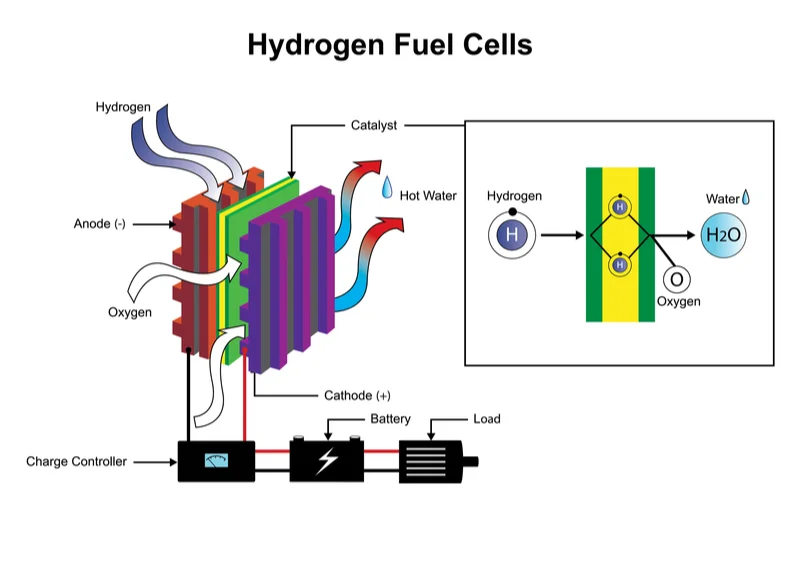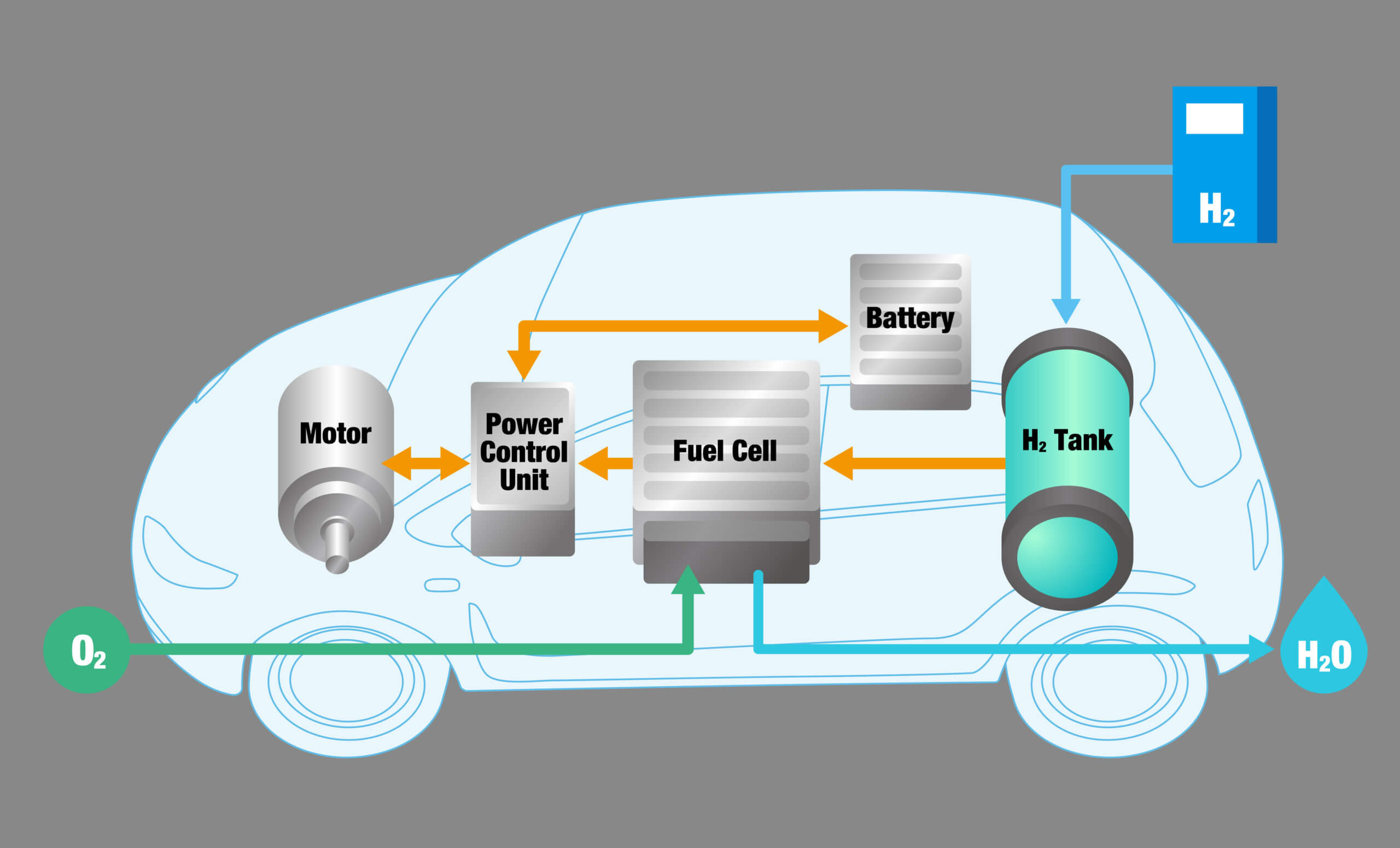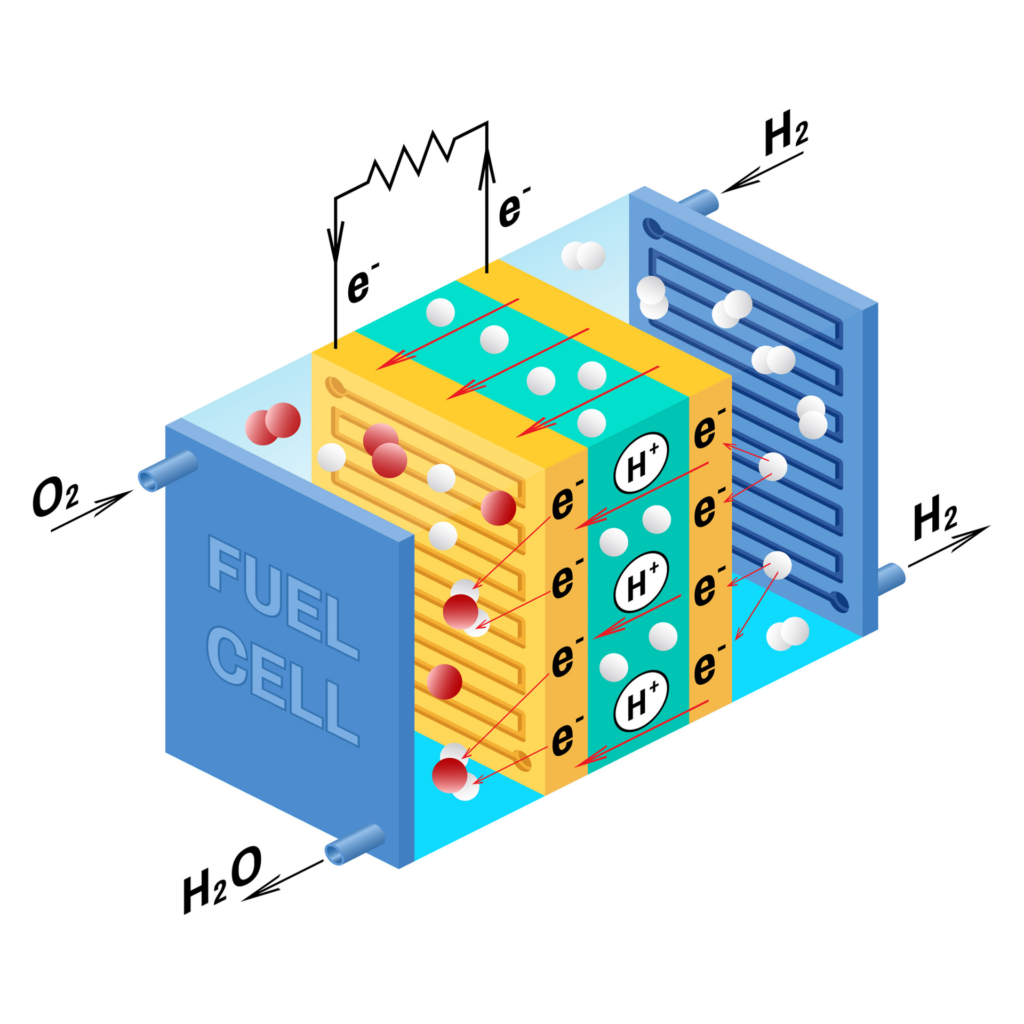Fuel Cells Advantages and Disadvantages – Fuel cells are electrochemical cells that transform the chemical energy of a fuel (usually hydrogen) and an oxidizing agent (usually oxygen) into electricity using a pair of redox reactions. Fuel cells are distinct from most batteries in needing a continuous fuel and oxygen source (regularly from the air) to maintain the chemical reaction.
In contrast, in a battery, the chemical energy comes typically from metals and their ions or oxides commonly already present in the battery, except in flow batteries. Fuel cells can generate electricity continuously for as long as fuel and oxygen are provided. Like any source of energy, hydrogen fuel cells have their advantages and disadvantages. In this post, we are going to present various aspects of their advantages and disadvantages in detail.
Linquip makes every effort to ensure that you have as much information about the fuel cells as possible. If you are looking for information about this type of energy source, Linquip is the best place for you. It is always possible to reach out to Linquip experts with any questions or concerns you may have regarding fuel cells. To get started, it is suggested that you read Linquip’s article titled “What Is Renewable Energy?“.
To take advantage of the full potential of the Linquip platform, you will need to become a Linquip Expert. The Linquip expert account can be very convenient for you to use to present your skills in the field of industrial equipment in a way that ensures that your knowledge and skills are matched to those of the industry. What are your thoughts on writing a guest post for Linquip’s website? Would you be interested in doing so? By using our Guest Posting feature, you can now publish your content directly on Linquip’s platform.

Fuel Cells Advantages
Hydrogen fuel cell technology offers numerous advantages over other power sources, including:
Renewable and Promptly Available
Hydrogen is the most abundant ingredient in the Universe and, despite the challenges related to its removal from water, is a uniquely renewable and plentiful source of energy, ideal for our future zero-carbon requirements for combined power and heat supplies.
More Robust and Energy Efficient Compared to Fossil Fuels
Hydrogen fuel cell technology gives a high-density energy source with excellent energy efficiency. Hydrogen has the leading energy content of any standard fuel by weight. High-pressure liquid and gaseous hydrogen have almost three times the gravimetric energy density of LNG and diesel and a comparable volumetric energy density to natural gas.
Hydrogen is a Reliable and Adjustable Energy Source to Assist Zero-Carbon Energy Strategies
Hydrogen fuel cells produce an intrinsically clean energy source, with no unfavorable environmental influence during running as the by-products are solely water and heat. Unlike hydropower or biofuel, hydrogen doesn’t need large fields to generate electricity. NASA has been working on applying hydrogen as a resource with the water created as a byproduct of drinking water for astronauts.
This proves that hydrogen fuel cells are a non-toxic fuel source and hence preferred to natural gas, coal, and nuclear power, which are all potentially hazardous or hard to obtain. Production, storage, and hydrogen use will play an essential role in stimulating further advancement of renewable energy by adjusting their alternate supply modalities with the challenging end-user requirements, avoiding the demand for notable early investment to enhance grid infrastructure.

Highly Efficient than Other Sources of Energy
Hydrogen fuel cells are a very effective way of energy production compared to other sources of energy, such as many green energy solutions. This fuel efficiency provides a higher production rate per kg of fuel. For instance, a traditional combustion-based power plant produces electricity at 33-35% efficiency, while a hydrogen fuel cell can generate electricity with an efficiency of up to 65%.
Diminishes Carbon Traces
With nearly no emissions, hydrogen fuel cells do not discharge greenhouse gases, which suggests they do not have a carbon track while in operation.
Virtually Zero Emissions
Hydrogen fuel cells do not produce greenhouse gas emissions as fossil fuel sources, thus diminishing pollution and promoting air quality.
Very Small Noise Pollution
Hydrogen fuel cells do not create noise pollution like other renewable energy sources, such as wind power. This also indicates that, much like electric cars, hydrogen-powered vehicles are much quieter than those that use traditional internal combustion engines.

Quick Charging Times
The charge time for power units of a hydrogen fuel cell is exceptionally speedy, comparable to that for traditional internal combustion engine (ICE) vehicles, and notably faster than battery-powered electric vehicles. Electric vehicles need between 30 minutes and several hours to charge; hydrogen fuel cells can be recharged below five minutes. This fast-charging time suggests that hydrogen-powered vehicles afford the same flexibility as standard cars.
Perfect for Application in Remote Areas
Local limitations allow hydrogen availability through local production and storage to be an alternative to diesel-based power and heating in distant areas. This will diminish the necessity to transport fuels and improve the life quality of those living in remote areas by offering non-polluting energy obtained from a readily available natural resource.
Extended Usage Times
Hydrogen fuel cells allow higher efficiencies regarding usage times. A hydrogen vehicle has an identical range as those that use fossil fuels (around 500 Kilometers). This is preferred to that currently proposed by electric vehicles (EVs), which are frequently being improved with fuel cell power units as range extenders. Hydrogen fuel cells are also not significantly affected by the outside temperature and do not decline in cold weather, unlike EVs. This benefit is extended further when coupled with the quick charging times.

Low Visual Pollution
Some low-carbon energy sources, including biofuel power plants and wind energy, can provide some poor visual scenes; however, hydrogen fuel cells do not have the equivalent space requirements, meaning less visual pollution.
The Versatility of Adoption
As the technology progress, hydrogen fuel cells will be able to afford energy for a range of stationery and portable applications. Hydrogen-powered vehicles are merely one example, but they could also be employed in more miniature applications such as domestic and larger-scale heating systems. Like ICE powerplants, the roles of energy storage capacity (i.e. the fuel tank) and engine size are decoupled. In contrast, battery-based power (i.e. power mounts linearly with mass) offers excellent design versatility.
The Democratization of Power Supply
Hydrogen fuel cells can diminish the dependency of a nation on fossil fuels, which will help democratize energy and power supplies worldwide. This increased independence will establish an interest in various countries that are currently reliant on fossil fuel stocks. Of course, this will also withdraw the problem of rising fossil fuel prices as supplies decrease.

Fuel Cells Disadvantages
Although the mentioned attractive advantages of fuel cells, here we are going to present some disadvantages of these systems.
Extraction of Hydrogen
Despite being the most plentiful ingredient in the Universe, hydrogen does not exist on its own, so it needs to be extracted from the water via electrolysis or insulated from carbon fossil fuels. Both of these methods need a notable amount of energy to accomplish. This energy can be more than that obtained from the hydrogen itself as well as being costly. Besides, this extraction typically requires the use of fossil fuels, which in the absence of CCS undermines hydrogen’s green credentials.
Considerable Investment for Development
Hydrogen fuel cells require finance to be developed to the point where they become a genuinely viable power source. This will also need the political inclination to spend the money and time on developing to enhance and develop the technology. The global objection to developing sustainable and widespread hydrogen energy is how best to build the supply and demand chain most cost-effectively.
Regulatory Problems
There are also restrictions around regulatory problems concerning the structure that represents commercial deployment models. Without explicit regulatory frameworks to permit commercial projects to realize their cost and revenue basis, commercial projects can struggle to attain a financial investment decision (FID).
Raw Materials Cost
Precious metals such as iridium and platinum are typically needed as catalysts in fuel cells and some water electrolyzer types, suggesting that the initial cost of fuel cells (and electrolyzers) can be expensive. This high cost has prevented some from investing in hydrogen fuel cell technology. Such costs require to be reduced to make hydrogen fuel cells a viable fuel source for all.

Overall Expense
The price for a unit of power from hydrogen fuel cells is now higher than other energy sources, such as solar panels. This may switch as technology advances, but nowadays, this cost is a barrier to hydrogen’s general use even though it is more effective once created. This expense also affects costs further down the line, such as with the price of hydrogen-operated vehicles, causing widespread adoption questionable at the moment.
Hydrogen Accommodation
Transportation and storage of hydrogen are more complicated than those required for fossil fuels. This means extra costs to consider for hydrogen fuel cells as an energy source.
Extremely Ignitable
Hydrogen is a highly combustible fuel source, which causes obvious safety concerns. Hydrogen gas burns in the air at concentrations varying from 4 to 75%.
Foundation
Since fossil fuels have been employed for decades, the infrastructure for this power supply previously exists. Large-scale adoption of hydrogen fuel cell technology for automotive applications will need a new refueling foundation to support it. However, for long-range applications such as those for delivery trucks and HGVs, start-to-end refueling will plausibly be utilized.
Conclusion
In this post, we have tried to describe the advantages and disadvantages of fuel cells. The benefits of hydrogen fuel cells as one of the most reliable renewable energy sources are apparent; there are still several challenges to overcome the full potential of hydrogen as a critical enabler for tomorrow’s decarbonized energy system.
Hydrogen could grow as the most reliable solution for the future of our energy demands, but this will require political will and financing to achieve. Nevertheless, as fossil fuels run out, hydrogen could be a fundamental solution for our global energy requirements.
More specific information is available at this link.
Download Fuel Cells Advantages and Disadvantages PDF
The entire contents of this article can be downloaded as a PDF file by clicking on the link provided below.
Buy Equipment or Ask for a Service
By using Linquip RFQ Service, you can expect to receive quotations from various suppliers across multiple industries and regions.
Click Here to Request a Quotation From Suppliers and Service Providers
Read More In Linquip
- What is Mixed Flow Turbine? Basics, Advantages, and Applications
- What is Boiling Water Reactor? Advantages, and Disadvantages
- What are the Disadvantages of Nuclear Fusion?
- Biofuels Advantages and Disadvantages in 2022
- How Does A Hydrogen Fuel Cell Work? (A Comprehensive Guide)
- Difference Between Renewable Energy and Fossil Fuels
- Biofuels Advantages and Disadvantages in 2022
- Is Natural Gas a Fossil Fuel?
- What are the Disadvantages of Fossil Fuels?
- Advantages of Fossil Fuels
- Renewable Energy vs Fossil Fuels | How do They Compare?
- The Biogas Generator: A New Approach to the Future of Fuels and Energy




I’m so happy I came across your article. You did a wonderful work, the information you gave was truly good. I could not help but discover just how much I have learnt from your article, and in turn what it would allow me to do next. Thanks for putting in the time to create such an insightful item of web content that has actually assisted me recognize extra concerning my topic of passion.
Thanks for sharing your experience with us! You can also visit our industrial directories, where you can find thousands of various industrial equipment based on your application and demand.